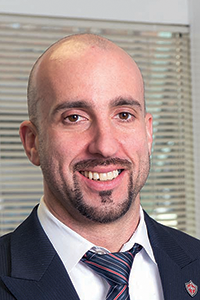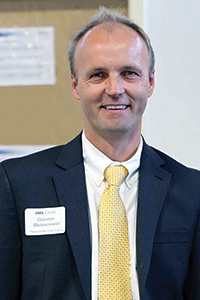Hampton Roads continues to diversify its economy while combating the effects of defense spending cutbacks. Currently, military spending represents more than 40 percent of the local economy.
“That’s more than it should be,” says Chuck Rigney, Portsmouth’s director of economic development, “We are fortunate, in the sense, that Hampton Roads has the world’s largest concentration of military and the country’s largest number of military commands outside of Washington D.C. The effect is that we have somewhat of an economic protection with those assets.”
But sequestration — across-the-board federal budget cuts — is causing ripple effects in the region’s economy.
“The threat of sequestration has caused the green light to go to yellow and sometimes put a stop on government spending and contracts in the area,” Rigney says. “It has put a chill on our economy. Everybody that [supplies] the military, such as major Department of Defense contractors, are holding back or waiting for work that would routinely be greenlighted, but nothing is routine anymore.”
Old Dominion University’s Economic Forecasting Project reported in January that Hampton Roads’ real gross regional product rose 2.2 percent last year and is expected to grow less than 2 percent this year.
The region is finding ways to diversify in order to remain healthy, Rigney says. “We want to make sure we can broaden our economy.”
In December, for example, two international companies, Germany-based Becker Hydraulics and Italy-based Pacorini announced plans to move into the region.
Becker Hydraulics will invest more than $500,000 in a manufacturing facility in Chesapeake’s Cavalier Industrial Park, creating 10 jobs. The company will produce hydraulic hose systems as well as fuel and bio-diesel hose assembly lines for various industrial applications. Pacorini, a logistics company serving the coffee industry, also will invest more than $500,000 in a Suffolk facility and create 10 jobs.
Bright spots for Portsmouth last year included national retailers such as Kroger Marketplace opening in areas of the city that previously were blighted or in need of shopping opportunities.
The city’s Old Town and downtown areas also are seeing a surge in multifamily housing, creating a higher density of people living and working in that area.
The Naval Medical Center Portsmouth and Portsmouth-based Norfolk Naval Shipyard continue to grow, and the city’s technology sector is expanding, Rigney says. “That’s an increasingly targeted area,” he adds.
The Portsmouth Marine Terminal on the west bank of the Elizabeth River reopened last fall after being closed since 2011. The Port of Virginia is talking with a handful of ocean carriers about moving additional smaller-vessel services into the terminal. “It’s becoming a player in helping bring additional cargo into the port,” says Rigney.
Hampton announced new business and expansion projects last year involving more than $106 million in capital investment and 2,085 new jobs.
“We’ve had over 760,000 square feet of commercial space sold, leased or renovated,” says Leonard Sledge, the city’s director of economic development.
One of the city’s biggest wins was the $25 million expansion of Alcoa’s Hampton Roads operations. The company will add equipment for a new production line and modify existing machinery to produce lighter-weight jet engine blades. Once production ramps up, the company expects to add at least 75 employees over three years.
Liberty-Source PBC will invest $1.56 million to begin operations at Fort Monroe, creating 596 jobs. The company will provide finance, accounting, human-resources, customer-care and support services for customers such as AOL.
Another Hampton deal involved the relocation of the national sales center for Newport News-based Ferguson, a major wholesale plumbing distributor, to the Hampton Roads Center’s central campus. The move could bring as many as 350 jobs to Hampton in the next three years.
Another win for Hampton was the opening of Faneuil Inc.’s customer contact center at Peninsula Town Center. The 22,250-square-foot facility represents a $2 million capital investment, creating up to 400 jobs.
Peter Chapman, Norfolk’s deputy city manager, says 2014 also was a “dynamic year” for the city. “Several major projects are under construction and emerging districts are taking off and defining their character,” he says. “Also, manufacturing is on the rise.”
One of the projects under construction is The Main, a $126 million Hilton hotel and conference center at the corner of Granby and Main streets. Also downtown, the former Waterside marketplace on the Elizabeth River is being transformed into an entertainment complex called Waterside Live!
Simon Premium Outlets is planning a 351,000-square-foot outlet in Norfolk this year. The $75 million investment will include up to 120 retail stores and will create 300 construction jobs and 800 permanent jobs.
In Suffolk, the arrival of Pacorini will contribute to the city’s growing reputation as a coffee industry hub. The company picked a 150,000-square-foot warehouse in the Northgate Industrial Park for its newest location. Locally, Pacorini will support the operations of Green Mountain Coffee Roasters, maker of Keurig’s K-cups, in Isle of Wight County.
Meanwhile, Massimo Zanetti, the largest private-label coffee producer in the U.S., is moving a production line from Canada to its Suffolk facility. The company will invest $4 million and hire 15 employees.
The Ohio-based J.M. Smucker Co., which owns Folgers, also will expand its liquid-coffee concentrate facility in Suffolk. The $4 million project will add 15,000 square feet.
One of the city’s largest new projects is Friant and Associates. The office furniture manufacturer is building a 357,000-square-foot manufacturing and distribution center.
The Newport News Economic Development Authority is riding the tide of growth as well. “We are causing and facilitating diversification of our economy,” says Florence Kingston, the authority’s director of development.”
The city received a new enterprise zone designation in December, which will allow it to offer new and expanding companies state incentives for job training to go along with local incentives.
One of the city’s largest deals was the $152 million expansion of Germany-based Continental, a major automotive supplier. Continental will make turbochargers at its Newport News site and boost production on its gasoline high-pressure injector, fuel rail and pump assembly lines. The project will create 525 jobs during the next three to four years.
The city also is assisting Liebherr Mining Equipment in its $53 million expansion, which is expected to create 174 jobs by 2017. The company, which makes coal-mining trucks, is doubling production. The project also includes a new training facility and additional office space.
The city is working with the Thomas Jefferson National Accelerator Facility as it prepares to compete for a medium-energy electron ion collider, which is expected to advance the study of sub-atomic matter interaction. The lab’s competition for the project is Brookhaven National Laboratory on Long Island.
Virginia Beach saw a rebound in industrial and retail activity last year. The city expects to add more than 1,400 new jobs by assisting in the expansion of 29 companies and recruiting 13 new businesses. “We have had $70 million in new capital investments,” says Warren Harris, the city’s director of economic development. “We are working with companies that will increase the per-capita income of our residents.”
One newcomer, Canada Metal (Pacific) Ltd., a manufacturer of marine and industrial products, is investing $3 million to establish its first U.S. manufacturing operation, creating 70 jobs over three years. “This company aligns perfectly with our aggressive growth in advanced manufacturing,” Harris says.
Last year the city opened the fifth phase of Town Center, adding more than 213,000 square feet of office space, 290 apartment units and a 927-space parking garage. It also leased 27,000 square feet of space to national retailers such as Anthropologie.
San Diego-based Green Flash Brewery broke ground on its first East Coast craft-beer brewery in the city’s Corporate Landing Commerce Park. The $20 investment project was announced in 2013.
Harris also notes the city is negotiating with a private-sector partner, which is investing $200 million, in developing the planned 500,000-square-foot Virginia Beach Arena.
“The city put in $53 to $78 million of infrastructure improvements around the site,” Harris says. “Our goal is to be up and opened by the fall of 2017.”


 “We also purchased a massage chair,” he says, noting he heard about that benefit at last year’s luncheon as well. “We thought that was an interesting idea. We bought one and put it in the break room. People love it.”
“We also purchased a massage chair,” he says, noting he heard about that benefit at last year’s luncheon as well. “We thought that was an interesting idea. We bought one and put it in the break room. People love it.” That market is increasing, says company President Guenter Weissenseel. “More and more cars have electric seats” for drivers. That means seats for the “passenger market are still growing. That could double in the next three to four years.”
That market is increasing, says company President Guenter Weissenseel. “More and more cars have electric seats” for drivers. That means seats for the “passenger market are still growing. That could double in the next three to four years.”